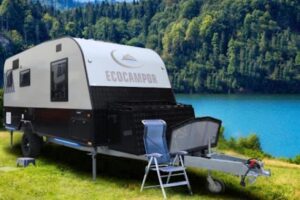What Size RVs are allowed in National Park Campgrounds?
RV sizes in the national campground vary but generally speaking, the common lengths are as short as 20 feet (6 meters) to as long as 40 feet (12 meters) or more. But each campground has its specific restrictions. Before you plan your adventure ensure the information from a reliable source like recreation.gov.
Why Size Matters in RVs
One of the most important considerations when shopping for an RV is where you plan to use your RV. In short, it depends on your particular requirements. Many RVers make the mistake of wanting a large RV to maximize the living space. However, a large RV size can limit the number of places you can stay, especially in state and national park campgrounds.
Another mistake is focusing only on some of the RV’s extra features. Getting caught up in the details and add-ons is easy without thinking about where and how you plan to camp.
Always ask yourself these questions before RV shopping:
1) Where do you most want to camp in your RV?
2) Do you plan to camp without hookups? a.k.a boondocking or dry camping?
3) What general size are the campsites where you most want to stay in your RV?
4) What size tow vehicle do you have? What is its towing capacity?
5) What size RV are you comfortable driving?
Sure, it’s nice to get an RV with all the bells and whistles, but you want to make sure that your RV will fit in the campgrounds you wish to stay at. State and national park campgrounds often only fit small towable RVs.
You also want to consider features that allow your RV to camp without utility hookups. Some state and national parks don’t have electricity, water, or sewer.
Finding an RV that has solar power or a generator is a great choice. So is one that has larger fresh water and waste tanks for boondocking. Sometimes backwoods camping is available for those campers that have off-road capabilities. Consider an off-road small camping trailer if you desire to camp in national forests or other backwoods areas.
Why National Park Camping Is So Popular
National Park camping is famous because of the spectacular sceneries and many RVers flock to camping in the parks to stay close to the action.
Many national parks are full of activities such as Ranger-led talks and guided hikes. Also, there are many activities you can enjoy within the park on your own such as hiking, biking, and paddling. Once you are in the park, there is often so much to see and do.
Plus, as a bonus, national park camping is often affordable as compared to privately owned campgrounds.
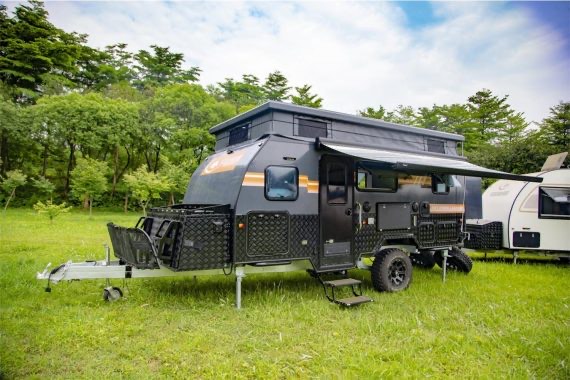
Amenities and Hookups in National Park Campgrounds
Amenities and hookups in national park campgrounds can vary widely, ranging from primitive sites with minimal facilities to developed campgrounds with a variety of services. Here’s an overview of what you might expect:
1. Basic Amenities
- Restrooms: Often with flushing toilets or vault toilets in more remote areas.
- Potable Water: Available via spigots or filling stations, though not necessarily at each campsite.
- Picnic Tables and Fire Rings: Most sites include a table and a place to safely have a fire, depending on local fire regulations.
- Trash Disposal: Centralized trash bins or dumpster sites for garbage and sometimes recycling.
2. Limited or No Hookups
- Electricity, Water, and Sewer Hookups: Full hookups are rare in national park campgrounds. Some may offer electric hookups, but many rely on campers being self-sufficient.
- Dump Stations: For RVs, campgrounds might provide access to a dump station for waste disposal, even if individual sites don’t have sewer hookups.
3. Additional Facilities (Varies by Location)
- Showers: Some campgrounds offer shower facilities, but they are not as common and may be located only in larger or more developed campgrounds.
- Laundry: A few campgrounds might have laundry facilities, especially those that cater to RVs or are located near lodging facilities within the park.
- Camp Stores: Offering basic supplies, food, firewood, and sometimes immersive camping gear. Availability can vary greatly depending on the park and campground.
4. Connectivity
- Cell Service and Wi-Fi: Generally limited or non-existent, especially in remote or rugged areas. Some campgrounds near visitor centers or developed areas may have better cell reception or even Wi-Fi access, but it’s not the norm.
Dry Camping
Dry camping, also known as boondocking, refers to camping without any hookups at all. This is often the case in national park campgrounds, as many sites offer primitive camping experiences to preserve the park’s natural beauty.
If you choose to camp in a site without hookups, you’ll need to rely on your trailer’s battery power, solar panels, propane, or a generator to run your appliances and air conditioning.
If you’re an experienced RVer or a nature enthusiast looking for a more authentic national park experience, dry camping could be the perfect choice for you. However, remember to be well-prepared and conserve your resources during your stay.
By understanding the different amenities and hookups available in national park campgrounds, you can choose the best camping option for your small camper trailer to enjoy camping in these beautiful locations.
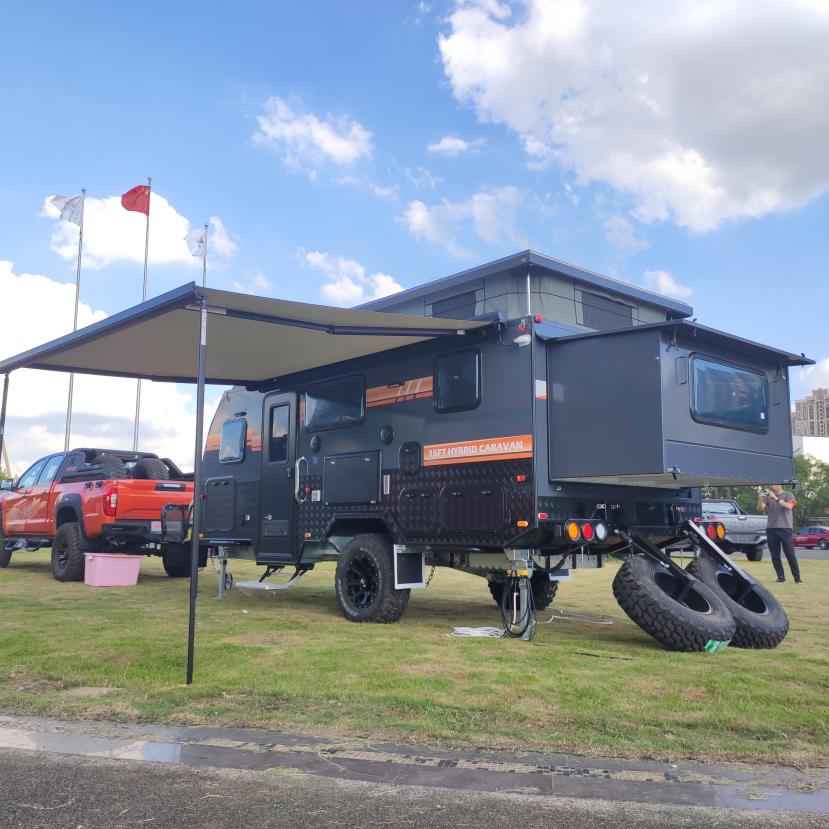
Alternatives to National Park Camping Also Great For A Small Camper Trailer
For those with small camper trailers looking for alternatives to national park camping, there are plenty of options that still offer the beauty of nature, recreational activities, and a sense of adventure. Here are some excellent alternatives:
Private Campgrounds and RV Parks
- Full Amenities: Private campgrounds and RV parks often offer full hookups and amenities like showers, laundry facilities, and even swimming pools and clubhouses.
- Reservations: They usually allow for advanced reservations, ensuring a spot upon arrival, which can be a significant advantage during busy travel seasons.
- Community Events: Some offer community events, like potlucks, movie nights, and activities for children, adding a social aspect to your camping experience.
State Parks
- Diverse Landscapes: State parks often feature beautiful natural areas similar to national parks, including forests, beaches, and desert landscapes.
- Amenities: Many state parks offer well-maintained campgrounds with a range of amenities, such as electrical hookups, water access, and sometimes even Wi-Fi, making them a great option for small camper trailers.
- Recreational Activities: Like national parks, state parks offer a variety of outdoor activities, including hiking, fishing, kayaking, and wildlife observation.
Bureau of Land Management (BLM) Lands
- Vast Open Spaces: BLM lands cover vast areas of the U.S., especially in the West, offering unique landscapes such as deserts, badlands, and canyons.
- Dispersed Camping: Many BLM areas allow for dispersed camping, ideal for small camper trailers looking for a free and secluded spot to camp.
- Recreational Opportunities: BLM lands are great for off-roading, rock climbing, river rafting, and exploring remote natural areas.
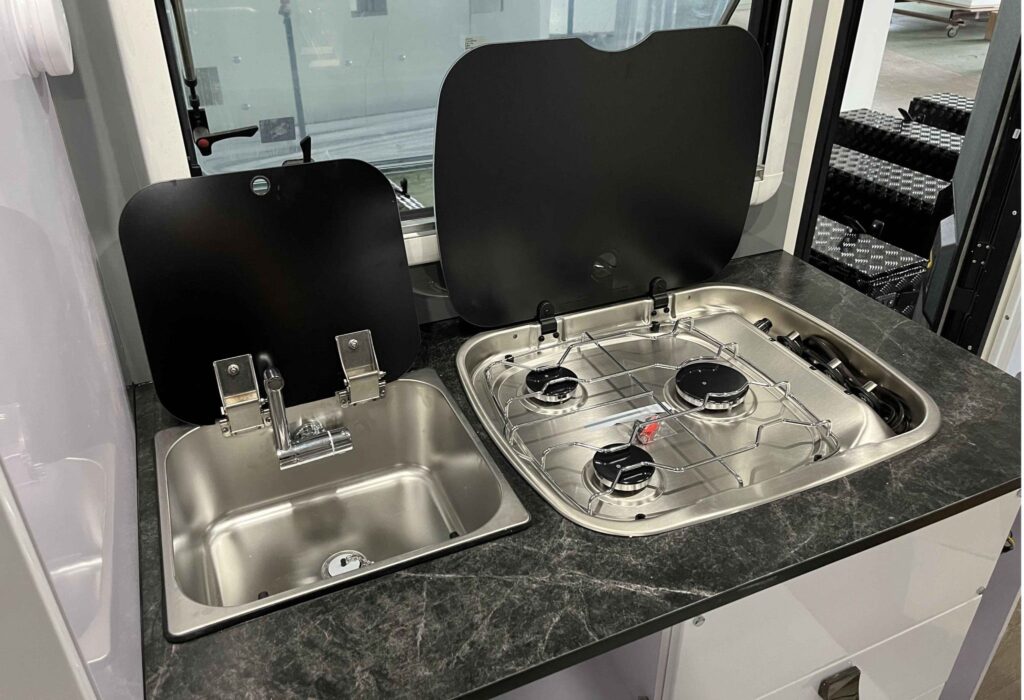
Advantages of Small Camper Trailers
So why are small camper trailers such a great RV choice for national park camping?
Off-Grid Features
With small camper trailers, you can enjoy the freedom of off-grid camping in many national parks. These trailers often come equipped with solar panels and water tanks, allowing you to camp without relying on external hookups. These features not only expand your range of potential campsites but also allow you to take advantage of the natural beauty and solitude of the great outdoors. In this way, you can visit the unreachable areas as well.
Fuel Efficiency
Small camper trailers are more fuel-efficient than larger motorhomes, such as Class A or Class C. They are also lighter with better fuel efficiency than fifth wheels and larger travel trailers.
Their compact travel trailer size and lightweight construction, often fiberglass travel trailers, make them a much easier towable trailer, even by small cars or small vehicles, leading to better fuel economy on your road trips.
The low dry weight not only allows you more flexibility on the tow vehicle but it offers more savings on fuel costs. You will have more money in your pocket to spend on experiences and adventures in the great outdoors.
Easy Maneuverability
As mentioned at the beginning of the article small campers provide easy maneuverability. That is most helpful when you’re navigating narrow roads, winding park entrances, or complex campsite layouts.
These compact trailers, with reduced lengths and electric brakes, make maneuvering, parking, and setting up at your chosen campsite simpler. This makes tiny trailers a popular option for both experienced and novice RVers.
Versatility in Campsite Choices
The small size of these trailers ensures you can fit comfortably into a variety of campsites, even those designed for tent camping. With a small travel trailer, you’re not restricted to large RV-only campgrounds, significantly increasing your options when planning your national park camping trip.
Lower Costs
Finally, small camper trailers typically have a lower initial purchase price than larger travel trailers or motorhomes. They also tend to incur lower ongoing costs, such as maintenance, insurance, and registration fees. Small camper trailers cost somewhere between $5,000 to $15,000.
With a lower overall cost, a small camper trailer is a great choice for budget-conscious consumers looking to make the most of their national park adventures without breaking the bank.
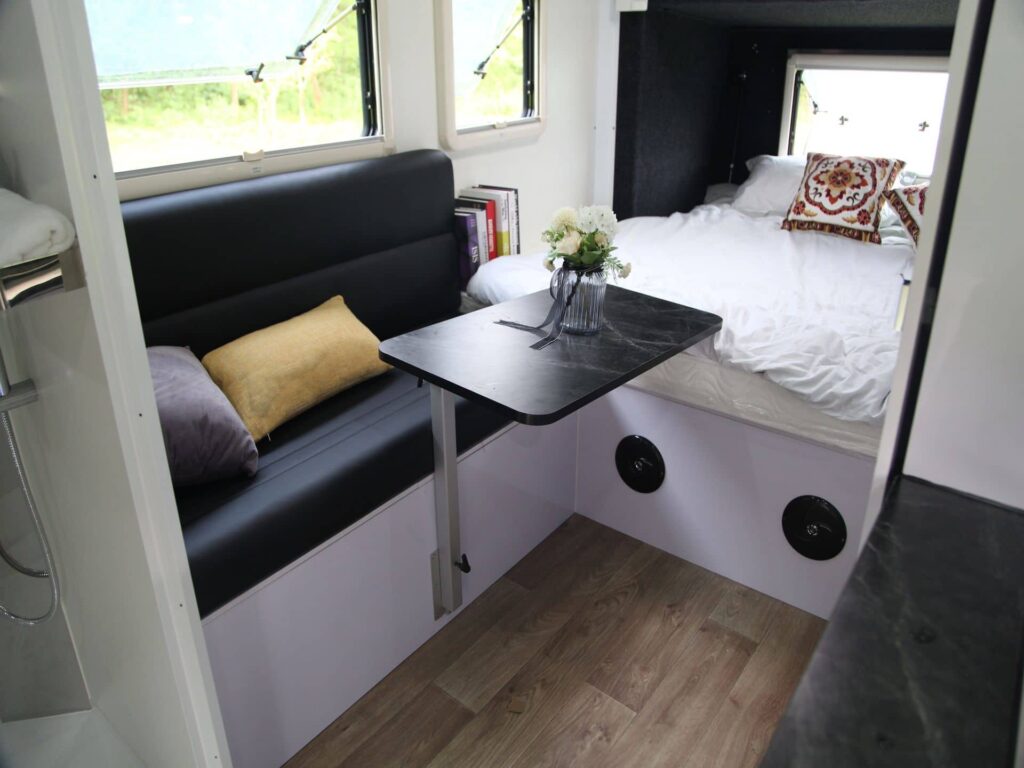
Small Camper Trailer National Park Camping Tips
Camping in a national park with a small camper trailer can be an incredibly rewarding experience, offering the comfort of your own space amidst the beauty of natural surroundings. Here are some tips to help you make the most of your adventure:
Reserve Early
National park campsites can fill up quickly, especially during peak seasons. It’s important to reserve your spot as early as possible. Many parks allow reservations up to six months in advance through websites like Recreation.gov.
Know the Size Limits
Make sure your camper trailer meets the size restrictions of the campsite. Some national parks have tight turns, low-hanging branches, or small campsites that cannot accommodate large trailers.
Pack Wisely
Space in a small camper trailer is limited. Pack efficiently, focusing on essentials and multipurpose items. Remember to bring adequate bedding, cooking supplies, food storage containers to protect against wildlife and clothing for all weather conditions.
Leave No Trace
Follow Leave No Trace principles to minimize your impact on the environment. This includes packing out all your trash, staying on designated roads and trails, and using established campsites.
Be Prepared for Wildlife
Store food and scented items securely to avoid attracting wildlife. Use bear-proof containers if you’re camping in bear country and follow park guidelines for wildlife encounters.
Check for Amenities
Some campsites offer full hookups for water, electricity, and sewage, while others might only offer dry camping (no hookups). Know what’s available and prepare accordingly. If you need to refill water tanks or charge batteries, plan your stay near facilities that offer these services.
Explore Sustainably
Use your camper as a base camp to explore the park. Stick to marked trails and scenic overlooks to reduce your environmental footprint. Consider using park shuttles if available to decrease vehicle congestion.
Weather Awareness
National park weather can be unpredictable. Check forecasts in advance and be prepared for sudden changes, especially in parks with high elevation or desert locations.
Respect Quiet Hours
National parks usually enforce quiet hours, typically from 10 PM to 6 AM. Be considerate of your neighbors by keeping noise to a minimum during these times.
Plan Activities
Research the park’s highlights, from hiking trails to guided tours. Prioritize what you want to see and do, keeping in mind distances and the time needed for each activity.
Which Small Camper Trailer is the Best?
There are many small campers to choose from. Here are some considerations to look for!
Terrain and Climate Considerations
When selecting a small camper trailer for your national park adventures, consider the terrain and climate of the parks you plan to visit. You’ll want a trailer that can handle various road conditions, from dirt roads to paved highways.
Some small travel trailers offer rugged construction for off-road adventures. Additionally, consider how the camper’s insulation and heating features will perform in colder climates.
Durability and Build Quality
It’s important to invest in a quality small camper trailer to ensure your RV can withstand years of national park camping. Pay attention to the materials used in the camper’s construction, such as aluminum or fiberglass trailers, which are more resistant to weathering. Choose trailers from respected RV manufacturers to ensure your chosen RV meets your durability and quality needs.
Interior Features and Comfort
The floor plan and interior space features of your RV are key to your camping experience. After all, this is your home away from home while exploring national parks.
Look for a small camper trailer that provides extra sleeping space, such as bunkhouse options, as well as smart storage space solutions.
Opt for models with a kitchenette that includes appliances like a refrigerator, stovetop, and sink. Some RVs even come with additional amenities like a small bathroom, an awning, an air conditioner, or even a slide-out kitchen outdoors for a comfy outdoor living area but this all depends on your budget as well.
Small Camper Trailers With Slide Outs And Pop Up Hybrid Trailers
Small camper trailers with slide-outs and pop-up hybrid campers with a rooftop tent can offer the best of both worlds when it comes to living space and ease of towing. Slide-outs add valuable floor space without greatly increasing the overall size of the camper, making it easy to tow behind most vehicles.
Pop-up hybrid trailers increase headroom and sleeping areas while still offering a smaller footprint. These types of trailers typically fold down for easy transport and set up quickly at your destination, providing added flexibility during your national park adventure. Many also still offer full bathroom facilities, which may include a wet bath or a dry bath.
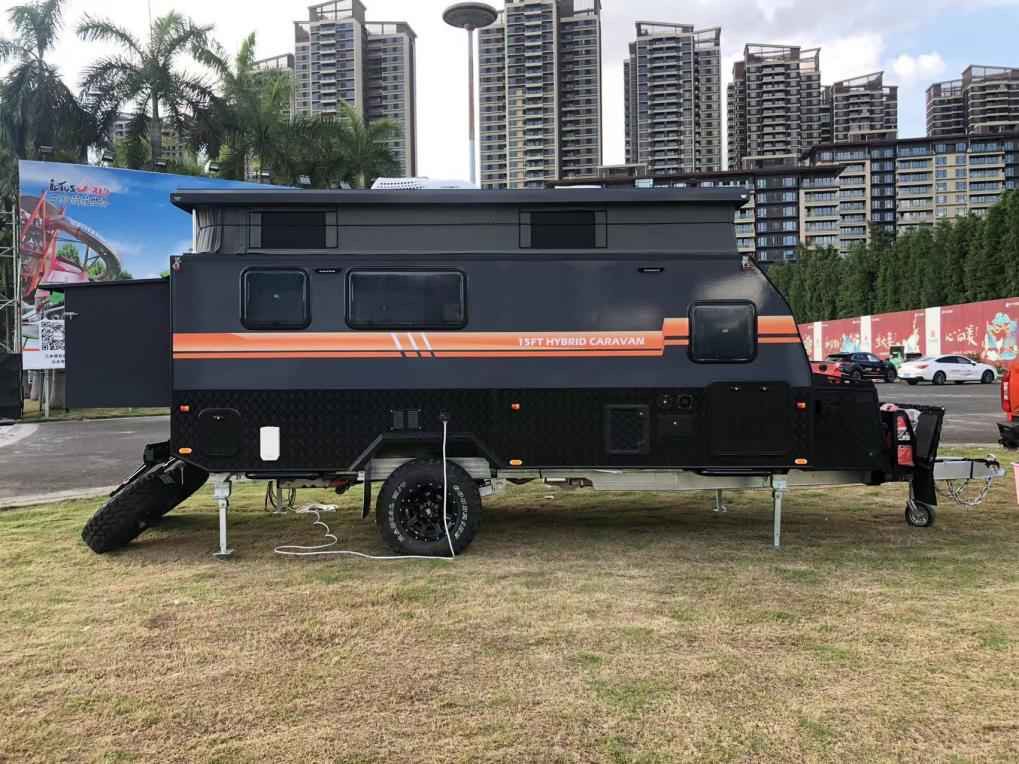
15-Foot Hybrid Off-Road Caravan ECO-P15 by Ecocampor
If you’re in the market for a lightweight travel trailer that combines functionality, comfort, and off-road capability, the Ecocampor 15-foot Hybrid Off-Road Caravan ECO-P15 stands out as a premier choice. Perfectly designed to accommodate a family of 4 and tailored to fit most national park campgrounds, this caravan is a testament to Ecocampor’s commitment to quality and innovation. Here’s what makes the ECO-P15 an exceptional option for outdoor enthusiasts:
1. Compact and Family-Friendly Design
The ECO-P15 is creatively designed with a bed slide-out feature and bunk beds, ensuring comfortable sleeping spaces for the whole family. The inclusion of a queen-sized bed adds a touch of luxury to the compact space.
2. Hybrid Design with Pop Top
The hybrid design incorporates a pop top, providing increased headroom and making the interior feel more spacious and comfortable, a rare feature in small camping trailers.
3. Fully Equipped Wet Bath
The inclusion of a wet bath with a shower, sink, and toilet covers all your basic needs, providing the convenience of home while on the road.
4. Outdoor Living Enhanced
For those who enjoy al fresco dining, the caravan features a retractable awning and a kitchen area equipped with a 3-burner stove and sink. The optional outdoor kitchen add-on further enhances the outdoor living experience.
5. Entertainment Options
The base model comes equipped with waterproof speakers and an MP3 player, ensuring your entertainment needs are met. For movie enthusiasts, a 24-inch LCD TV is available as an additional option.
6. Self-Sufficient Power Supply
The caravan is fitted with a solar power system, including maintenance-free batteries, a solar controller, and 2000W solar panels, perfect for camping sites without electricity and reducing your carbon footprint.
7. Off-Road Capabilities
The ECO-P15 is built to handle off-road adventures, equipped with an independent suspension system and off-road tires. This allows for smooth navigation over uneven surfaces, opening up a wider range of camping locations.
8. Versatility and Accessibility
Its size and features make the ECO-P15 ideal for fitting into most national park campgrounds, ensuring that you won’t have to miss out on visiting some of the most beautiful natural sites.
Why Choose Ecocampor For Your Small Camper Trailer
You may be wondering if choosing an international brand of off-road camping trailers is a good fit for your dealership. Ecocampor is known for quality products that exceed customer expectations. More than 75% of Ecocampor campers created over nearly 15 years are still on the road today and ready for the next adventure.
Ecocampor’s mission is to make the camping experience easier and more enjoyable for outdoor enthusiasts. If run an RV business, your customers will be thrilled to have these quality camper options available to purchase at your dealership. Offering this unique selection is a good idea to help set your business apart from others who haven’t yet discovered Ecocampor while also keeping up with the increase in demand for off-road trailers.
Ecocampor is the #1 RV factory in China and offers opportunities for dealerships in select markets in North America, Australia, Europe, Japan, Korea, the Middle East, and South Africa. Ecocampor Trailers provides you and your sales team with exceptional products and options, great customer service, dealer support, and marketing tools. They have a long history of taking care of customers and working hard for dealers.
Ecocampor’s Quality Process
Ecocampor has a 3 step quality process to deliver the best-constructed off-road camping trailers and truck campers to the customers. The newest manufacturing technology is used to produce campers that stand the test of time. As soon as you view an Ecocampor product in person, you can see the difference in quality compared to other brands. Schedule your factory tour now.
Material Quality
First, all materials are inspected for quality before entering the manufacturing process. Any defect found in the material will not be used to construct an Ecocampor RV.
In-Production Quality Control
The quality assurance officer inspects different stages in RV production. If faults are found in the production process, the camper will not continue to the final manufacturing stage.
Final Inspection
The most detailed inspection occurs in the final manufacturing state. This inspection includes electrical components, durability, safety, and many other final checkpoints to guarantee the quality of the finished camper.
Expert inspectors must approve all checks before the RV is allowed to pass the production process. This final inspection guarantees that the quality of the finished product is ready for customer delivery.
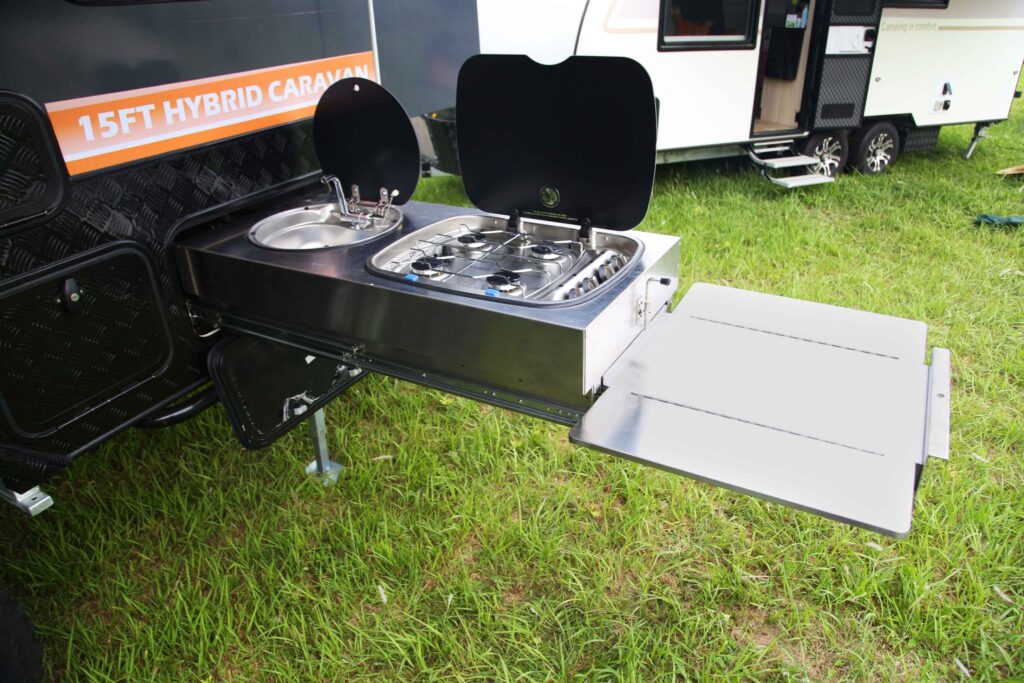
Frequently Asked Questions
Are Small Camper Trailers Best RVs for National Camping?
Yes, small camper trailers are considered the best RVs for national camping due to their compact size, ease of maneuverability, and versatility. They can fit into most national park campgrounds, have wider access, and are cost-effective, making them ideal for those seeking a national camping experience.
What Size RVs Are Allowed in National Park Campgrounds?
The size of RVs allowed in national park campgrounds varies, with common lengths ranging from as short as 20 feet (6 meters) to as long as 40 feet (12 meters) or more. However, each campground has specific restrictions. It’s essential to check reliable sources like recreation.gov before planning your adventure.
Why National Park Camping Is So Popular?
National park camping offers spectacular scenery, ranger-led activities, and a variety of recreational opportunities like hiking, biking, and paddling. It’s also often more affordable compared to privately owned campgrounds, making it a favored choice among RVers.
Which Brand is the Best for Small Camper Trailer?
Ecocampor is the best brand to boy small camper trailers. They are known for their quality products, exceptional customer service, and dealer support. With a long history of satisfying customers and offering innovative camping solutions, Ecocampor stands out as a top choice for dealerships and consumers alike, providing durable and versatile camping trailers suitable for various outdoor adventures.


